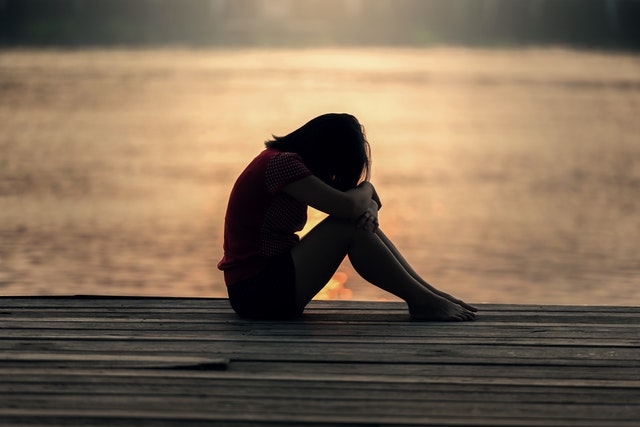
The content provided here is not intended to be a substitute for professional medical advice, diagnosis, or treatment. Always seek the advice of your physician or other qualified health providers with any questions you may have regarding a medical condition.
Last month, the South Asian community was awakened by the loud silences of mental health. The late Nima Bhakta, an Indian woman living in Southern California, passed away while battling with postpartum depression. In honor of her, we hope to help shed light and break the stigma around postpartum depression. Postpartum depression (PPD) is a serious mental illness that involves rapid changes in hormone levels and affects behavioral and physical health.
Feeling hopeless, empty, or depressed after childbirth is not an expected part of the process. The period after delivery is a particularly vulnerable time for many women. Having a child is an exciting and joyous experience, despite the anxieties of parenting. However, for women with PPD, being a mother can be coupled with extreme sadness, indifference, and unconnectedness to her child.
PPD can also involve many of the following symptoms:
- Feeling restless, moody, or anxious
- Feeling hopeless, worthless, guilty or overwhelmed
- Crying frequently or isolating yourself
- Having thoughts of hurting yourself or the baby
- Not feeling connected to the baby
- Having no energy or motivation
- Changes in appetite, sleep, and/or energy
- Having trouble focusing or making decisions
- Withdrawing from friends and family
- Thoughts of suicide with or without a plan
“I didn’t want you to see how different I became after Keshav…and I don’t know how I could have changed so dramatically…”
Over 50% of women suffering from postpartum depression remain undiagnosed (and often feel trapped), of which 1 out of 5 respond to their suffering with suicide. Nima felt she was fighting the PPD battle alone – against herself, against her family, against her community. Many women of color feel alone through this process and became part of the growing statistic of suicide being the second common cause of postpartum death. Cross-cultural research has found that 80% of women do not share their symptoms or seek medical attention. Before Nima passed, she left a letter describing the uphill battles of building awareness and understanding PPD in the South Asian community.
“It was something you guys wouldn’t understand because the Indian society does not fully understand postpartum depression.”
Nima was not the first to feel trapped by the South Asian community’s stigmas, nor will she be the last. Postpartum depression is a mood disorder that does not discriminate by race or ethnicity. Research by Goyal et al. found that South Asian women living in the United States were just as likely to experience PPD symptoms as their Caucasian counterparts. Although PPD is serious, however, it is a treatable medical illness.
South Asian women worry that speaking up about their symptoms is a sign of weakness. Often they worry if they may not be fulfilling their obligations as a mother. They don’t experience the feeling of unconditional love for their child. Medication is not always the preferred solution as it has the potential to poison the child (via breastfeeding). The challenge is access to culturally and linguistically competent psychotherapists is limited…and sometimes, even frowned upon.
Culture plays a significant role in all human experiences and is rooted in shared ideas and perspectives, standards for community responses, and cognitive styles. Culture can impact the way South Asian women experience PPD but also the way they may ask, or even, not ask, for the support they require. The cultural barriers surrounding mental health play a significant role in preventing South Asian women with PPD symptoms from reaching out for support. Because of this, high PPD frequencies in Western societies claim that PPD is a “culture-bound syndrome“. Exacerbating this challenge, Western societies promote the notion of “individual responsibility”, which leads to social isolation and higher rates of depression. To break the stigma for Nima and other South Asian women out there, it is important to not only become aware of PPD and its impact on the community, but also recognize the importance of how support from family, friends, and the community can reduce PPD-related deaths. Here are five suggestions on how loved ones can help someone who is showing signs of PPD:
- Know the Signs. Learn to recognize the symptoms of depression, anxiety, and PPD. If you see signs, urge her to seek the support of a healthcare professional.
- Listen. Let her know you want to hear her concerns, and they are valid. For example, “I notice you are having trouble sleeping, even when the baby sleeps. What’s on your mind?”
- Validate. Let her know she is a good mother despite what she may be feeling. Her feelings and hormone changes are not a reflection of her parenting.
- Give Her Support. Let her know she’s not alone, and you are here to help. With a new child in the family, a mother can feel overwhelmed with suggestions from family on how to care for the baby. During this time, it is important to check in on the mother’s emotional needs as she tries to balance multiple stressors within the traditional frameworks.
- Encourage Her to Seek Help. She may feel uncomfortable and not want to seek help. Encourage her to talk with a primary care physician or psychotherapist. Share information on postpartum depression symptoms. Offer to make an appointment for her to speak with someone.
- Postpartum Support International: 1-800-944-4773 or text 1-503-894-9453 for a free, 24-hour confidential helpline to receive support, resources and connect to support groups.
- SAMHSA National Helpline: 1-800-662-HELP (4357) for a free, confidential, and year-round referral and information service on all mental health disorders.
- National Suicide Prevention Lifeline: 1-800-273-TALK (8255) for free and confidential emotional support—they talk about more than just suicide.
- Shakti Therapy & Healing Services provides psychotherapy services with a specialty in working with South Asian populations. Feel free to reach out to me at info@shaktitherapyhealing.com.
Commit to breaking stigmas for South Asian women. Commit to breaking stigmas for all women. We can all play a part in fostering a community where seeking support is celebrated. Join me in lifting Nima’s voice by placing your hand over your heart as we share some names of just a few women who have fallen victim to PPD in 2020:
Ashley ᐧ Nisha ᐧ Irma ᐧ Denise ᐧ Rachel ᐧ Karen ᐧ Laura ᐧ Emily ᐧ Beatrice ᐧ Sarah ᐧ Chandani ᐧ Zeena ᐧ Carrie ᐧ Erica ᐧ Tina ᐧ Aarti ᐧ Hilda ᐧ Anilu ᐧ Jenn ᐧ Caitlin ᐧ Delia ᐧ Dominique ᐧ Alpa ᐧ Esha
Rest in power, Nima.
Ektha Aggarwal is a licensed psychotherapist and CEO of Shakti Therapy and Healing Services in Los Angeles, CA. Ektha specializes in working with South Asians and people of color to break the stigma around mental health and instill the concept of immigrant resilience. To learn more about Shakti Therapy and Healing services, please visit www.shaktitherapyhealing.com or email Ektha at info@shaktitherapyhealing.com.


 Ringing in Change: Sakhi’s Historic Achievement
Ringing in Change: Sakhi’s Historic Achievement Good Indian Girl, Sort Of: Sonya Soni
Good Indian Girl, Sort Of: Sonya Soni Ambika Mod Makes Us Bawl Our Eyes Out in ‘One Day’
Ambika Mod Makes Us Bawl Our Eyes Out in ‘One Day’